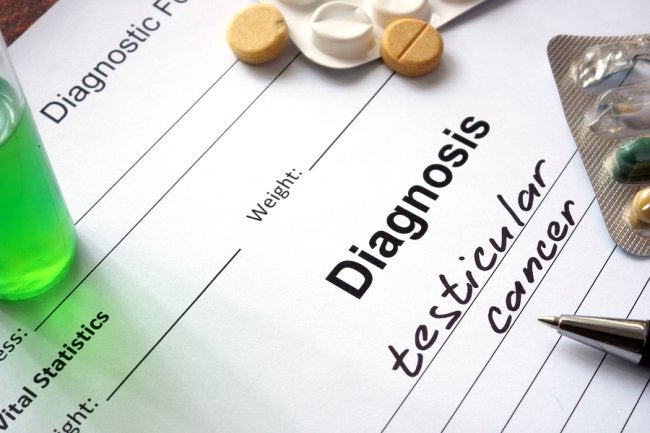-
Understanding Peyronie’s Disease

Peyronie’s disease is a painful condition that can have significant impacts on sexual health and relationships for men. If you are suffering from this condition, make an appointment with a urologist. Treatments are available that can improve your symptoms and provide relief from the stress that often accompanies Peyronie’s disease. Here is a closer look at the condition and what treatments are available.
What Is Peyronie’s Disease?
Peyronie’s disease is a condition in which fibrous tissue inside of the penis causes it to curve during erections. This curvature is often extremely painful and can make it impossible to have sexual intercourse. The exact causes are not known. In some cases, injuries to the penis can cause the growth of fibrous scar tissue that does not stretch during erections as healthy tissue does. For some men, the causes of Peyronie’s disease are not known. Doctors suspect that a hereditary component may be involved, but the research as yet is inconclusive.
What Are the Symptoms?
Often, men with Peyronie’s disease can feel lumps of scar tissue under the skin of the penis. During erections, there will be a noticeable bend in the penis, or it may take on a narrowing or hourglass shape. Peyronie’s disease can also cause erectile dysfunction and intense pain during erections. In response to these symptoms, it is common for men with Peyronie’s disease to experience anxiety or depression related to their sexual health.
What Treatments Are Available?
In some men, Peyronie’s disease resolves on its own with any treatment. Medications to reduce scar tissue formation and relax the curvature of the penis are available through injections, and topical or oral medications. Surgery, including penile implants and grafting, can also help to reduce Peyronie’s disease symptoms.
At Urology Associates, our urology specialists treat a range of sexual dysfunction issues in both men and women. If you are suffering from Peyronie’s disease or another condition that prevents you from having healthy sexual relationships, call us today at (855) 901-1338 to make an appointment with a urologist in Nashville.
-
Is Diabetes Linked with Erectile Dysfunction?
The impact of diabetes on sexual health is often overlooked, but sufferers frequently have symptoms of sexual dysfunction. For men, diabetes can often lead to erectile dysfunction that can be difficult to overcome without specialist treatment.
This video explains more about the link between erectile dysfunction and diabetes. Having diabetes for a long time and having poor blood sugar control increase the risk of ED. While oral therapies for ED are often ineffective in men with diabetes, a urologist can offer alternative treatments to reverse impotence.
Don’t let issues with your sexual health in Nashville go untreated. At Urology Associates, P.C., our experts have solutions that work. Make an appointment with a urologist today by calling (855) 901-1338.
-
Get the Facts About Testicular Cancer

Testicular cancer stands out from other forms of cancer in that it is more common in young men than older men. Because it often occurs in a population that is not considered to have a high cancer risk, men with testicular cancer may often miss the early symptoms because they are unsure of what to look for. Fortunately, cancer treatment from your urologist can be effective in helping you beat this disease. Explore the facts about this disease and the testicular cancer treatments so you can be vigilant about your own health.
Recognizing Your Risk Factors
There are several risk factors for testicular cancer, however, most men who develop this kind of cancer do not have any noticeable risk factors present. Having an undescended testicle is one of the biggest risk factors, so your doctor may monitor you for testicular cancer symptoms if you have this condition. HIV infections, being Caucasian, and having a family or personal history of testicular cancer may also increase your risk. Approximately 50 percent of men with testicular cancer are between 20 and 34, but it can and does affect men in all age groups, including infants.
Spotting the Symptoms
A lump or swelling in one testicle is a common sign of cancer. In some cases, men may develop gynecomastia as the result of testicular cancer. Young boys who develop testicular cancer may experience an early onset of puberty. In some cases, men do not have symptoms at all in the early stages and may develop back pain, belly pain, headaches, and shortness of breath as a result of testicular cancer that has spread. Performing self-exams can help men recognize the symptoms sooner.
Talking About Treatment
Testicular cancer treatments vary depending on the stage of the cancer at the time of diagnosis. Surgery to remove the affected testicle as well as chemotherapy, radiation, and stem cell therapy can all be helpful.
Testicular cancer treatment in Nashville starts with the urologists at Urology Associates. If you have symptoms, get on the road to diagnosis and treatment today by calling (855) 901-1338.
-
Hormone Replacement and Low T Treatment

Men who have been experiencing sexual health issues such as erectile dysfunction may decide to consult a urologist to find out if they could have low testosterone levels, or low T. It’s perfectly natural for a man’s testosterone levels to decline gradually with age. However, for some men, the signs and symptoms of changing hormone levels are difficult to cope with. Urologists previously gave men with impotence oral testosterone therapies. However, it’s now known that these medications are not effective and may even be harmful.
Similarly, testosterone injections do not create stable testosterone levels and may lead to testicular atrophy. There are better options available today, such as transdermal applications. Men who are interested in a long-term solution might consider receiving an implantable pellet, which releases testosterone over four to six months.
Urology Associates, P.C. is pleased to offer transdermal testosterone therapies and implantable pellets to men who experience sexual health problems in Tennessee. Give us a call today at (855) 901-1338 to set up an appointment.
-
What Men Need to Know About Chronic Pelvic Pain

Although chronic pelvic pain is most often associated with women, it’s also a real health problem for men. Unfortunately, it can also be difficult to diagnose. Primary care physicians may run numerous tests and fail to come up with an answer for patients’ symptoms. This is one reason why it’s advisable to turn to a specialist for help. A urologist can help men with chronic pelvic pain understand their condition and identify their treatment options.
Symptoms
Chronic pelvic pain syndrome (CPPS) can involve a wide range of symptoms that may arise periodically and may persist for a long time. Men may report suffering from pain in the urethra, penis, prostate, testicles, perineum, rectum, or groin. The pain may even develop in the thighs, lower abdomen, tail bone, and lower back. It’s not unusual for patients to have trouble pinpointing exactly where the pain is, since it can be felt deep within the body, may be intermittent, and may wax and wane.
Complications
Men with CPPS may report various complications to their urologist. Men may suffer from urinary incontinence. CPPS is associated with urinary frequency, urinary urgency, pain while urinating, or a weak stream. Sexual dysfunction may also occur, including erectile dysfunction, low libido, premature ejaculation, and painful ejaculation.
Causes
Chronic pelvic pain is associated with a number of underlying medical problems, including chronic prostatitis. This refers to an inflammation of the prostate gland , which is usually the result of a chronic bacterial infection. Men with chronic prostatitis may find relief with antibiotics, perhaps combined with alpha-blockers. CPPS may also be associated with epididymitis, testicular problems, scrotal problems, and pelvic floor muscle spasms.
At Urology Associates, P.C., we understand the complexities of diagnosing and treating men with chronic pelvic pain. Our team of urology specialists in Tennessee encourages men to visit one of our 12 clinics for an evaluation, even if they have previously been evaluated elsewhere. New and current patients can reach us at (855) 901-1338 to request an appointment.
-
What Causes Low Sex Drive in Women?
 Given that much of the research on sexual dysfunction focuses on the male partner, low sex drive in women is not as well understood. However, it’s more common than you might think. Urology specialists have termed this condition hypoactive sexual desire disorder (HSDD). More research is needed in this area to definitively determine exactly what causes low libido in women. However, there are currently two primary schools of thought: The vascular theory and hormonal theory.
Given that much of the research on sexual dysfunction focuses on the male partner, low sex drive in women is not as well understood. However, it’s more common than you might think. Urology specialists have termed this condition hypoactive sexual desire disorder (HSDD). More research is needed in this area to definitively determine exactly what causes low libido in women. However, there are currently two primary schools of thought: The vascular theory and hormonal theory. Vascular Causes
Urology specialists already know that in men, circulatory problems can contribute to sexual dysfunction because of the inhibition of blood flow to the penis. The vascular theory of female HSDD applies this concept to women. It’s thought that women may suffer from low sex drive because reduced blood flow to the pelvic region may prevent sexual arousal, promote vaginal dryness and discomfort, and reduce sensitivity of the clitoris. Growing older, being under severe or chronic stress, or having certain medical conditions such as diabetes and atherosclerosis might contribute to inhibited blood flow to the pelvic region . To address this problem, urologists may recommend topical applications to dilate the blood vessels, increase blood flow, and improve sensitivity and arousal.
Hormonal Causes
Other urologists believe that hormonal imbalance may be primarily responsible for HSDD. As women grow older, their levels of estrogen and testosterone begin to decline. Much like men who are trying hormone replacement therapy, women might consider synthetic hormones to counteract the changes associated with aging.
Contributing Factors
It is quite possible that other issues may contribute to HSDD, perhaps in addition to hormonal or vascular problems. Female sexual dysfunction may be attributed to a prior injury that has caused nerve damage, such as a spinal cord injury. Similarly, women who have previously undergone surgery in the pelvic region may have sustained nerve damage. Other possible risk factors may include excessive bicycle riding, drug use, smoking, and vaginal atrophy.
At the Women’s Institute for Sexual Health (WISH), women will find sensitive and compassionate sexual health care in Nashville. The urology team at Urology Associates, P.C. offers the latest FDA approved treatment for low libido in women, Addyi (fibanserin). Call us today at (855) 901-1338 to arrange a private, one-on-one consult with a urologist.
-
Exploring Treatment Options for Overactive Bladder
Overactive bladder is a common health problem that can significantly affect a person’s quality of life. If you suffer from difficult-to-control urination and frequent urination, a urologist can help you consider your treatment options.
Some of your treatment options may include those explained in this video. You could try bladder training and Kegel exercises. You might also try lifestyle modifications, such as managing your fluid intake, reducing caffeine, losing weight, and avoiding alcohol. Other patients may need medications or perhaps surgical intervention.
If you suffer from an overactive bladder and live in Tennessee, consult a urologist at Urology Associates, P.C. Call us at (855) 901-1338 to schedule a urology exam or browse our website to explore our treatment options for related conditions, including bladder cancer and erectile dysfunction.
-
When Blue Pills Fail
-
Symptoms of Interstitial Cystitis

Interstitial Cystitis (IC) is a condition of the bladder and urethra that affects both men and women. The condition can be diagnosed and treated by a urologist at a urology center near you. Before you visit your urologist, you should be familiar with the most common signs and symptoms of interstitial cystitis so that you can give an accurate description of how they affect you.
The primary symptoms of interstitial cystitis are bladder pain, incontinence, and urinary urgency and frequency. Many women mistake these symptoms for a urinary tract infection and seek UTI treatment from a urologist. Bladder pain will worsen as your bladder fills, and weaken after urination. Pain may also occur in the abdomen, urethra, or vaginal or testicular area. Pain may worsen during sex or while exercising. You will feel the urge to urinate frequently, and experience continuous pressure in your lower abdomen.
If you’re experiencing any of these symptoms and would like treatment for IC or incontinence near Nashville , visit Urology Associates, P.C. Our urologists can evaluate your symptoms and determine if you suffer from interstitial cystitis or a urinary tract infection. To schedule an appointment, call (888) 329-7700 today.
-
What Causes Female Pelvic Pain?

If you’re suffering from female pelvic pain, you should visit a urologist near you as soon as possible. Female pelvic pain may be a symptom of a variety of different health conditions, and some of them can be serious. Here is a look at some of the most common causes of female pelvic pain.
Urinary Tract Infections
Urinary tract infections occur when bacteria enter the urinary tract through the urethra and multiply in the bladder. UTI symptoms include a strong urge to urinate, a burning sensation or pain when urinating, discolored or strong-smelling urine, pelvic pain in the center of the pelvis around the pubic bone, and passing small amounts of urine frequently. If you don’t visit a urologist for UTI treatment, the infection can spread to your kidneys.
Disorders of the Reproductive System
There are a number of health problems that can occur in the female reproductive system whose symptoms include pelvic pain. Uterine fibroids and ovarian cysts are very common—and generally benign—causes of pelvic pain. Ovarian cancer can also cause pelvic pain along with other severe symptoms. An ectopic pregnancy or miscarriage may result in pelvic pain, and should be investigated by a gynecologist, obstetrician, or doctor immediately. Pelvic inflammatory disease is another common cause of pelvic pain.
Kidney Stones
Kidney stones are small mineral deposits that form in the kidneys and can affect the urinary tract and bladder. There is not always a single, identifiable cause for kidney stones. Common symptoms of kidney stones include severe pain in the side and back, abdominal and pelvic pain, painful urination, discolored urine, cloudy or foul-smelling urine, frequent urination, fever, and chills. Your urologist can provide kidney stone treatment, which may include antibiotics, pain relievers, or surgery.
If you’re looking for a urologist near Nashville who can provide safe, effective pelvic pain, kidney stone, or UTI treatment, come see us at Urology Associates, P.C. Our urologists have extensive experience in treating and diagnosing the causes of female pelvic pain. To schedule a urology appointment, call us today at (888) 329-7700.
Recent Posts
categories
- Uncategorized
- Bladder Cancer
- Women's Sexual Health
- MonaLisa Touch
- Urology
- Urologist
- Erectile Dysfunction
- Kidney Cancer
- Incontinence
- Prostate
- MonaLisa Touch Laser Treatment
- Kidney Stones
- Urinary Tract Infections
- Event
- Sexual Dysfunction
- Testicular Cancer
- Prostate Cancer
- Urology Surgery Center
- urinary incontinence
- vaginismus
- noncoital pain disorder
- Hypoactive Sexual Desire Disorder
- Infographic
- provenge
- Xofigo
- robotic surgery
- hormone replacement
- diabetes
- renal cell carcinoma
- pelvic pain
- hematuria
- sexual health
- chronic testicular pain
- premature ejaculation
- Men's Health Clinic
- Dr. Melvin Seard
- Interstitial Cystitis
- vasectomy
- overactive bladder
- vaginal atrophy
- nocturia
- bladder infections
- urethral strictures
- Acute Epididymitis
- low sex drive
- circumcision
- pelvic floor dysfunction
- Peyronie's Disease
- prostatitis
- female sexual dysfunction
- varicocele
- difficult urination
- low libido
- PSA levels
- male fertility
- penile prosthesis
- prostatic intraepithelial neoplasia
- male infertility
- estrogen levels
- nurse navigator
- stress urinary incontinence
- vaginal yeast infection
- elevated psa
- painful sex
- adult circumcision
- epididymitis
- OAB
- kidney infection
- penile cancer
- pelvic organ prolapse
- Vasectomy Reversal
- bone health
- cystectomies
- clinical trials
- bloody urine
- Advanced Therapeutic Center
- WISH MedSpa
- neurogenic bladder
- WISH Team
- prostate biopsies
- BPH
- fecal incontinence
- lithotripsy
- osteoporosis
- kidney cysts

